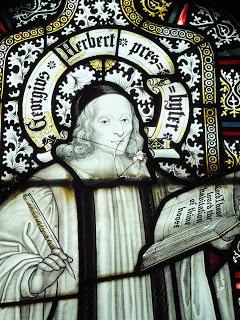My Little Gnudren,
When old Gnu was passing through Helensburgh to visit his grandgnulet, and her saintly parents, he chanced upon the Oxfam Shop and therein he purchased a wee boook [as they say up there] containing the Poems of George Herbert. This edition was published between 1903 and 1905,

and it has laid unread for 116 years. Here is the evidence:

The pages are joined together so you can only read every other 2 pages! It is almost in pristine condition, and the tops of the pages have guilt edges. Maybe one of the two knowledgeable readers of this Blog will be able to tell me why old books were often put together this way. I should think Dr. Mier should be able to tell us why, as she is a bit of an expert, I suspect, on all things relating to books.
Well, despite the eulogies heaped upon Mr. Herbert in the introduction of this book by a real poetry enthusiast, His Grace, the Right Reverend William Alexander, the Archbishop of Armagh, Lord Primate of Ireland, the original owner of this volume was not inclined to read it.

It was obviously on a bookshelf together with other unread books for show. [Note to self: …must take my book on Permselectivity of the Glomerular Capillary Wall to Macromolecules off my shelf. It’s only there for showing off. Mea Culpa!]. And, Old Gnu assumes that unless the original owner lived to over 100 years, the second owner likewise, or perhaps even a third, nay, a string of sinners, never read the poems of the saintly Mr. Herbert.
Dear readers, Old Gnu would have you know that The Rt. Rev. William Alexander was the husband of Mrs. Cecil Frances Alexander who wrote the words of Once in Royal David’s City, All Fings Bright & Bootiful, and a number of other hymns in the current churches repertoire which are regarded as ‘classics’.

Perhaps they talked in rhyme over the breakfast table.
But, as usual, Old Gnu digresses. After separating several pages in Mr. Herbert’s book he lighted on a poem of Herbert’s which he did not know. This poem poses a question – “Does Mr. Herbert still smell?” The poem, in its entirety, is printed below. Now this may smack a bit of those wretched comprehension tests in English Lessons at secondary school when we wore short trousers, but it is an important and pertinent question that Mr. Herbert asks himself. He can’t answer it because he is long since dead to this world: To repeat the question: Does Mr. Herbert still smell? [Please note, when you read the poem that despite going to Cambridge Universitie, Mr Herbert couldn’t spell properlie.]
LIFE
I made a *posie, while the day ran by:
Here will I smell my remnant out, and tie
My life within this band.
But Time did *becken to the flowers, and they
By noon most cunningly did steal away,
And wither’d in my hand.
My hand was next to them, and then my heart:
I took, without more thinking, in good part
Times gentle admonition:
Who did so sweetly deaths sad taste convey,
Making my minde to smell my *fatall day;
Yet **sugring the suspicion.
Farewell *deare flowers, sweetly your time ye spent,
Fit, while ye liv’d, for smell or ornament,
And after death for cures.
I follow straight without complaints or grief,
Since if my *sent be good, I care not if
It be as short as yours.
*spelling mistake
** fatall spelling mistake
Well, what’s the answer? By Old Gnu’s calculations, he still smells after 388 years. Yep, and you could also say, that he has had a ‘curing’ influence after his death. His poems have focussed many minds down the centuries on issues of importance, thus bringing a therapeutic influence to bear upon them.
Well this is a real surprise especially since he mucked up his career big time. He came from a very wealthy family holding high positions and status, related to the Earls of Pembroke. His mother was a friend of John Donne and other poets and Artists. While he was a studying at Cambridge he became the University’s Public Orator. He attracted the attention of King James I, had a brief spell as a Member of Parliament. His older brother who inherited the family estate became a soldier, poet and philosopher and his younger brother, Sir Henry Herbert, was Master of the Revels to kings Charles I and Charles II. But in 1629, at the age of 36, our George chucked it all in and became clergymen in the Church of England with responsibility two small churches in the rural parish of Frugglestone St. Peter with Bemerton near Salisbury. There, in addition to the normal requirements of clergyman, he was noted for his unfailing care of the poor and his saintly life.
He only lived another 3 years. He suffered from poor health all his life; what they called Consumption [Tuberculosis]. There he wrote poems and also The Country Parson His Character and Rule of Holy Life a book that is still influential today.
Now the question is: Would he still smell if he had pursued a political career and held positions in government or even the Royal Court? Very much doubt it. One wonders what he thought when he sat down to compose his little poems in a rural backwater? In 1633, George, on his deathbed, sent the manuscript of The Temple [a collection of sacred poems] to Nicholas Ferrar, telling him to publish the poems if he thought they might “turn to the advantage of any dejected poor soul”, and otherwise, to burn them. Ferrar arranged to publish them that year. By 1690 they had gone through 8 editions.
Old Gnu is minded of someone else who only had a 3 year burst. He didn’t write any poems or anything and he still smells to High Heaven 2000 years on.
The question is, How long will I smell for after death? Fortunately that is a question we are not required or capable of answering personally. Now Old Gnu has an excuse for getting rid of all his deodorants.

Vetus Pater Gnu
Musicorum et Theologia
Turris LA
I Mensis Iulii MMXXI

